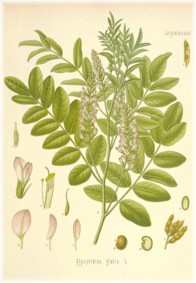Lickerish Licorice
By Audrey Stallsmith

Two barefoot urchins, sucking long liquorice laces, halted near him, gaping at his stump with their yellow-slobbered mouths.
James Joyce--Ulysses
For Valentines' Day, let's talk about the candy which can be a dangerous attraction. "Lickerish" is an old adjective that means "tempting to the appetite." And the treat which is its homophone certainly entices, but some people should think twice before yielding to this "sweetroot."
True licorice can be either very good or very bad for you. It soothes coughs and sore throats, slakes thirst, improves adrenal function, lowers cholosterol, soothes skin irritations, reduces the inflammation of arthritis, heals ulcers, and stimulates the production of interferon.
On the negative side, overuse of the herb causes irregular heartbeat, raises blood pressure and fluid retention, depletes postassium, and lowers testosterone. Like many other legumes, licorice has an effect similar to estrogen, which has led to its being called an anti-aphrodisiac.
Many candies called licorice, however, are actually flavored artificially or with anise. Only the real thing has the effects mentioned above.
The common name is a corruption of the offical one, Glycrrhiza glabra, which derives from the Greek glukos ("sweet") and riza ("root"). Over the centuries, that evolved into liquiritia and Lycorys and, finally, licorice. In England lozenges flavored with the plant are also known as Pontefract or Pomfrey cakes--after the region where it was once grown.
A tender perennial, licorice prefers the sandy soil near streams. Its yellowish roots usually aren't harvested until their third year, with the fourth-year yield being considered the best.
In the past, those roots commonly flavored medicines, malt liquors, and tobacco, as well as sweets. But all forms of licorice should be avoided by persons with high blood pressure or heart disease--and by pregnant women.
On the other hand, the herb is considered beneficial for those with Parkinson's Disease or hypoglycemia. But it's probably safest to make this black-hearted charmer an occasional indulgence--not an obsession!








